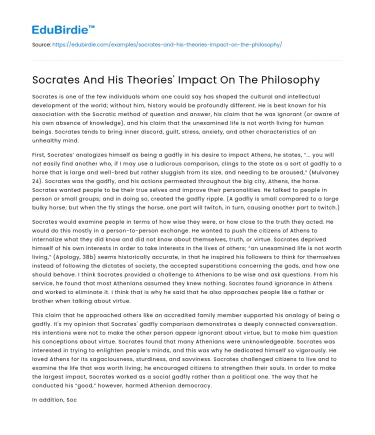Socrates is one of the few individuals whom one could say has shaped the cultural and intellectual development of the world; without him, history would be profoundly different. He is best known for his association with the Socratic method of question and answer, his claim that he was ignorant (or aware of his own absence of knowledge), and his claim that the unexamined life is not worth living for human beings. Socrates tends to bring inner discord, guilt, stress, anxiety, and other characteristics of an unhealthy mind.
First, Socrates’ analogizes himself as being a gadfly in his desire to impact Athens, he states, “... you will not easily find another who, if I may use a ludicrous comparison, clings to the state as a sort of gadfly to a horse that is large and well-bred but rather sluggish from its size, and needing to be aroused,” (Mulvaney 24). Socrates was the gadfly, and his actions permeated throughout the big city, Athens, the horse. Socrates wanted people to be their true selves and improve their personalities. He talked to people in person or small groups; and in doing so, created the gadfly ripple. (A gadfly is small compared to a large bulky horse; but when the fly stings the horse, one part will twitch, in turn, causing another part to twitch.)
Save your time!
We can take care of your essay
- Proper editing and formatting
- Free revision, title page, and bibliography
- Flexible prices and money-back guarantee
Socrates would examine people in terms of how wise they were, or how close to the truth they acted. He would do this mostly in a person-to-person exchange. He wanted to push the citizens of Athens to internalize what they did know and did not know about themselves, truth, or virtue. Socrates deprived himself of his own interests in order to take interests in the lives of others; “an unexamined life is not worth living,” (Apology, 38b) seems historically accurate, in that he inspired his followers to think for themselves instead of following the dictates of society, the accepted superstitions concerning the gods, and how one should behave. I think Socrates provided a challenge to Athenians to be wise and ask questions. From his service, he found that most Athenians assumed they knew nothing. Socrates found ignorance in Athens and worked to eliminate it. I think that is why he said that he also approaches people like a father or brother when talking about virtue.
This claim that he approached others like an accredited family member supported his analogy of being a gadfly. It's my opinion that Socrates' gadfly comparison demonstrates a deeply connected conversation. His intentions were not to make the other person appear ignorant about virtue, but to make him question his conceptions about virtue. Socrates found that many Athenians were unknowledgeable. Socrates was interested in trying to enlighten people’s minds, and this was why he dedicated himself so vigorously. He loved Athens for its sagaciousness, sturdiness, and savviness. Socrates challenged citizens to live and to examine the life that was worth living; he encouraged citizens to strengthen their souls. In order to make the largest impact, Socrates worked as a social gadfly rather than a political one. The way that he conducted his “good,” however, harmed Athenian democracy.
In addition, Socrates claimed to have a premonition to avoid politics. Apparently, no just man could be involved in politics and still be just. Regardless of what he thought of politicians, he did like the democratic government of Athens. His actions, on the other hand, were not beneficial for democracy at the time. Instead of speaking his mind with an audience, Socrates stirred the pot—he went person-to-person in semi-private/private settings to discuss matters. From there, these citizens spread the word to others and so on. I suspect his actions were seen as suspicious acts by the political leaders.
To conclude, Socrates was a discrete philosopher who molded the intellectual development of the world and shaped history. He encouraged all to seek out knowledge, discuss beliefs, and to question the known and unknown. Socrates brought a type of conflict (questions of the known and unknown) to the human mind. His small bites of communication impacted Athens greatly; he impacted both Athens and the world.






 Stuck on your essay?
Stuck on your essay?

